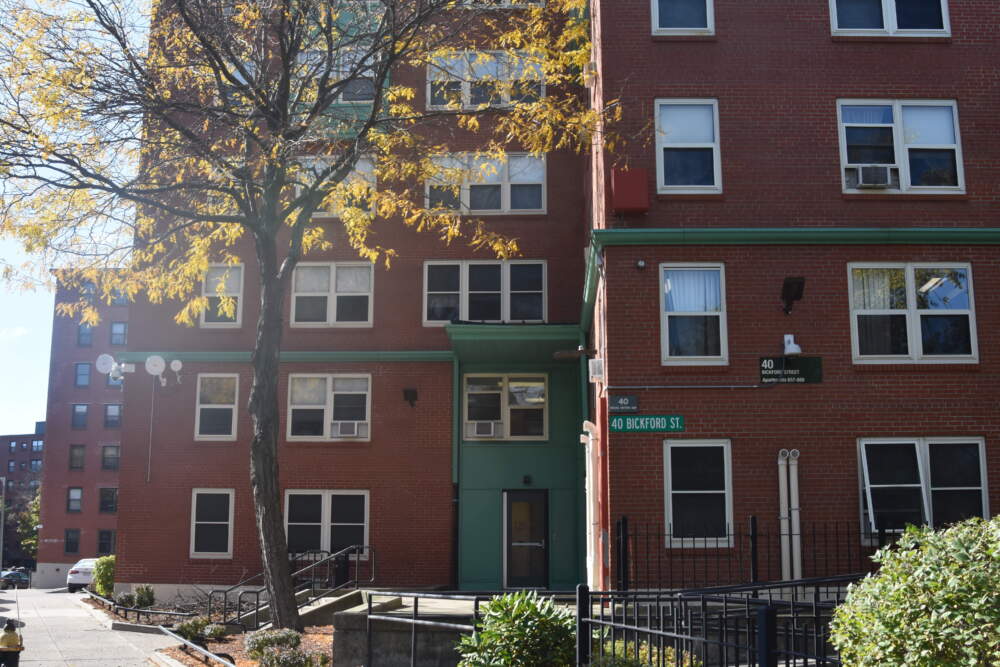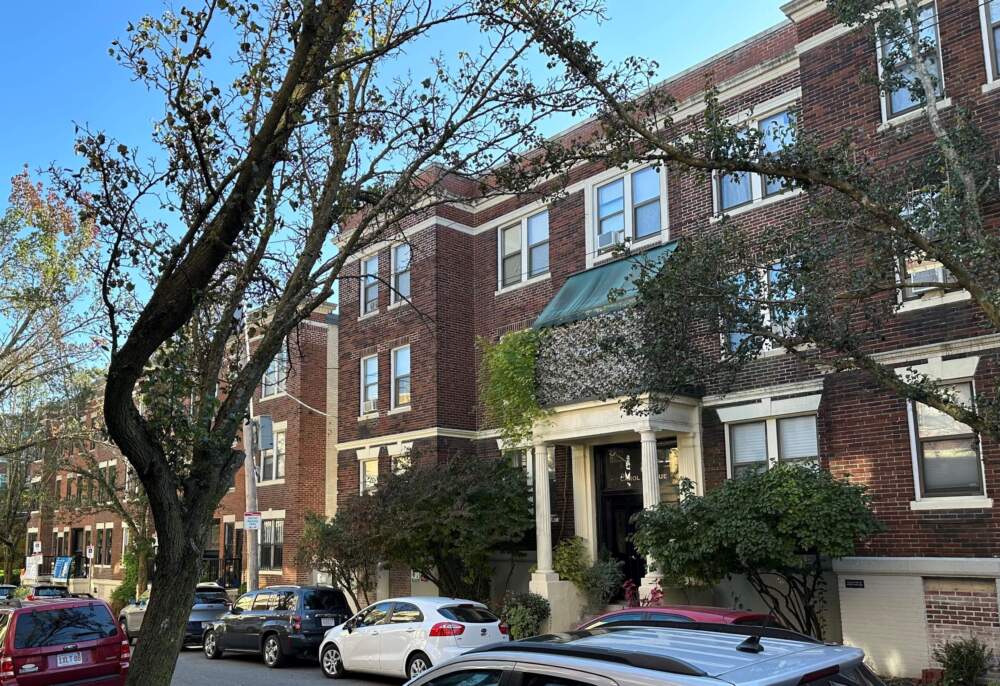Advertisement
Mass. awards $27 million to help ‘decarbonize’ hundreds of affordable housing units

The Healey administration awarded $27 million to several affordable housing developments on Tuesday to help them reduce planet-warming emissions and increase energy efficiency in more than 700 units across the state.
The money, which comes from the Affordable Housing Deep Energy Retrofit Grant Program announced earlier this year, will be used to install electric heat pumps, insulate walls, replace old or leaky windows and, in some places, put up solar panels.
“In Massachusetts, affordable homes and clean energy go hand-in-hand,” Gov. Healey said at an event celebrating the grant recipients. “This program is what our approach is all about. [It’s] an opportunity to invest in homes and good jobs, an opportunity to create more livable communities.
"It's an opportunity as well for the people who've borne the brunt of extreme weather and high energy costs to be the first in line to benefit from a clean energy revolution.”
There are more than 2.6 residential homes and apartments in Massachusetts and many of them are old, poorly-insulated and heated with fossil fuels. “Decarbonizing” them — or dramatically reducing emissions by electrifying appliances — is central to Massachusetts’ climate goals.
Currently, buildings account for about 35% of all emissions in the state, though in some cities like Boston that figure is closer to 70%. By mid-century, “the building sector must approach near-zero emissions,” according to the state’s climate roadmap.
Reaching that goal will take a lot of work and a lot of money. This is particularly true for low- and moderate-income housing units, whose landlords, often nonprofit owners, may struggle to afford much-needed maintenance work, let alone the high upfront costs of deep energy retrofits and building electrification.
“For affordable housing, it’s imperative that we keep costs down,” said Bill Womeldorf, a project manager with the Valley Community Development group, a nonprofit affordable housing developer that was awarded $2 million for a project in Northampton.
In the long run, building decarbonization projects save money, he added, “but the upfront costs are a challenge. And this grant really helps us offset that.”
Advertisement
Caitlin Robillard, director of real estate development at the Alston Brighton Community Development Corporation, which also received some of the grant money, agreed.
“On average, these deep energy retrofits, compared to traditional rehab, cost [more] per unit,” she said. “So thank God the state recognized that and put something new out there for us to access.”

Beyond slashing carbon emissions, the grant-funded work will make living in these renovated units more comfortable. Residents will have access to efficient heating and cooling, and they’ll breathe cleaner air thanks to new air filtration systems and electric stoves. The retrofits are also expected to reduce on-site energy use, which translates to lower utility bills for residents or building owners.
“This program demonstrates how we can decarbonize [the building] sector with an equity lens," Rebecca Tepper, the state’s secretary of energy and environmental affairs, said in a statement. “With every investment, we right past wrongs and bring the benefits of the clean energy transition to those who have been denied climate justice.”
Importantly, the projects receiving money are experimenting with slightly different technologies and materials, which will help the state and others in the construction industry see what works best.
“We’ve got ten projects we’re talking about today, and I think there are nine different types of insulation being used,” Elizabeth Mahony, commissioner of the Department of Energy Resources, said at Tuesday’s event. “So we are doing good work and testing out theories so that the next batch of projects will be even better and more efficient."
Gov. Healey established the Affordable Housing Deep Energy Retrofit Grant Program in February with $50 million from the Department of Environmental Protection, the Department of Energy Resources and some money from the American Rescue Plan Act.
This week’s first round of grants will award a total of $27.35 million and the rest will be awarded in the coming months. Mahony said the state is actively looking for other funding opportunities so it can continue supporting the grant after the initial $50 million is spent.
Also earlier this year, the Healey administration established the country’s first “green bank” dedicated to financing new climate-friendly affordable housing and retrofitting existing buildings.
Here are the 7 grant winners from the first round:
Allston Brighton Community Development Corporation (Boston)
The state awarded this community based nonprofit two grants: $800,000 for renovating the Hano Homes project in Allston and $950,000 for the Carol Avenue apartments in Brighton.
At the Hano Homes, 20 apartments will get a big overhaul. The existing siding on the buildings will be stripped, and the complex will get a new, more energy efficient and airtight exterior. The buildings will also get electric heat pumps for heating and cooling, electric hot water heaters, and rooftop solar panels. The goal is to get this complex “passive house” certified and reduce energy consumption by at least 70%.
At the Carol Avenue apartments, 33 apartments — 29 of which are deemed “affordable” — will be retrofitted so they’re more energy efficient and use electric heat pumps and hot water heaters. The work is expected to reduce energy use by 55%.
Beacon Communities Development (Easthampton)
This affordable housing developer received $3 million to do a deep retrofit of its 60-unit Treehouse community in Easthampton, which provides affordable housing for seniors and families with foster children.
The project will involve electrifying all heating and hot water systems, adding new exterior insulation and energy efficient windows and putting solar panels on rooftops.
The Boston Housing Authority (Jamaica Plain)
The nonprofit will use the $6.36 million dollar grant from the state to improve 159 affordable units at the Mildred C. Hailey apartments in Jamaica Plain. The gas heating systems in the buildings will be replaced by electric heat pumps, which will also provide cool air in the summer. The exterior of the buildings will also be replaced with airtight, more energy efficient materials for better insulation. Though not technically part of the grant, the housing authority is also looking at adding solar panels to the buildings to generate clean energy onsite.
When the work is complete, the renovated buildings should use about 60% less energy.
The Community Builders (Worcester and Greenfield)
The state is giving this nonprofit developer money for two of its affordable housing complexes: $960,000 for its Plumley Village development in Worcester and $1.56 million to help turn a department store in Greenfield into 39 affordable units.
The Plumley Village project will fully electrify 24 affordable units and reduce energy consumption by about 30%. At the Greenfield project, the goal is to reduce energy costs by at least 60%. Both locations are hoping to receive passive house certification.
Preservation of Affordable Housing (Salem)
The nonprofit will use the $5 million to improve 127 units of affordable senior housing at its Fairweather Salem development. The current gas heating system will be replaced by electric heat pumps for heating and cooling, and the building will undergo a deep energy retrofit to improve efficiency. The building will also get a new ventilation system.
When the work is complete, total energy use is expected to decrease by 80% and onsite carbon emissions will be about zero.
The Valley Community Development Corporation (Northampton)
With a $2 million grant, this group plans to turn a former nursing home in Northampton into 60 affordable and energy efficient units. Instead of using a gas boiler, the renovated building will be heated and cooled with a ground-source heat pump. The group also plans to install a 300 kilowatt solar system on the roof to help supply clean electricity.
By the time the project is done, overall energy consumption is expected to decrease by a whopping 90%.
Winn Development (Brookline and Boston)
The state grants will help fund retrofits of 147 units — the majority of which are affordable housing — at two Winn Developments in the greater Boston area. The company will use $5.9 million at The Village at Brookline and $680,000 at the Mission Main Apartments in Boston to fully electrify heating and hot water, insulate the buildings to passive house standards and install solar panels.
The company expects to reduce overall energy demand by 60-70% after the work is complete.
